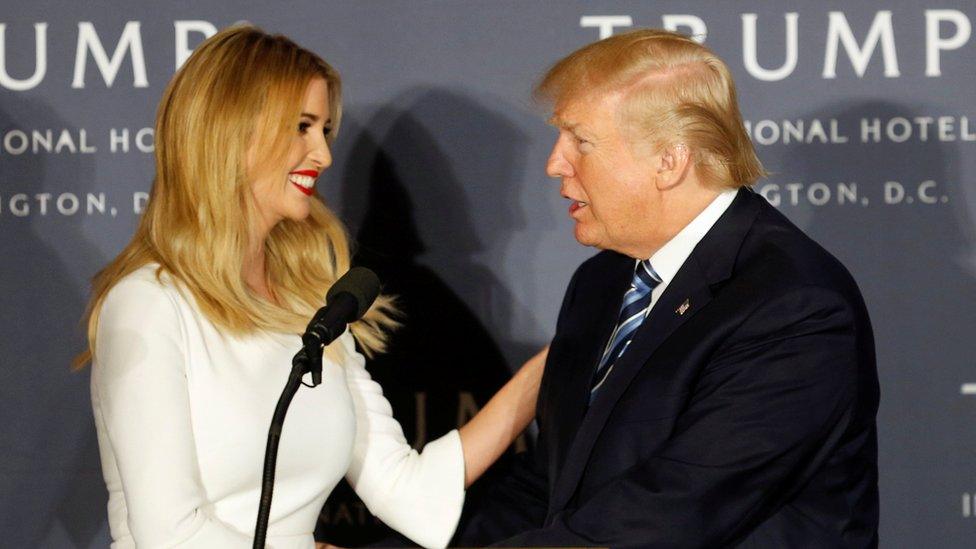What conflicts of interest could Donald Trump have as president?
- Published
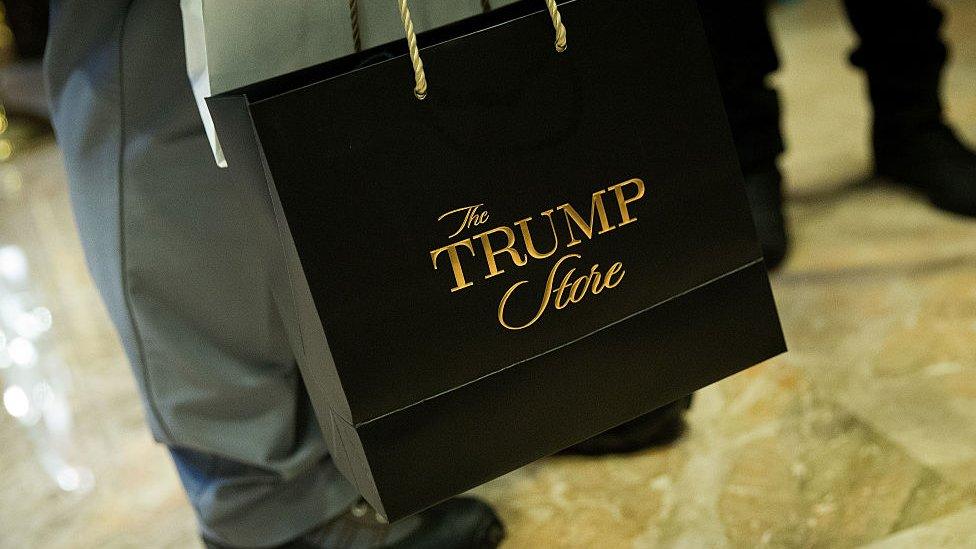
As Donald Trump prepares to take over as the next US president, attention has turned to what he will do with the business that helped propel him to the White House.
Concern has been rising over potential conflicts of interest between the government and the Trump Organization and particularly the organisation's dealing with foreign governments.
In a series of tweets on Wednesday, Mr Trump appeared to take steps to downplay those concerns saying in part, "I will be leaving my great business in total in order to fully focus on running the country."
During the campaign the President-elect regularly touted his business skills. He spent an estimated $50m (£40m) of his own money to finance his presidential run.
So far Mr Trump has not provided details of how the "total" split will take place and who will then take control of his business. But his tweets did announce he would hold a press conference with his children on 15 December to discuss the matter.
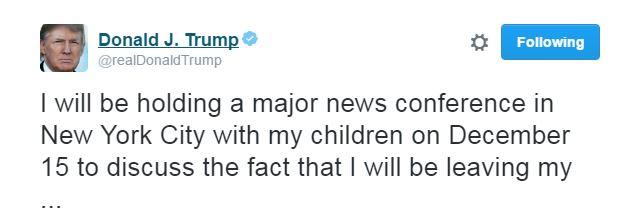
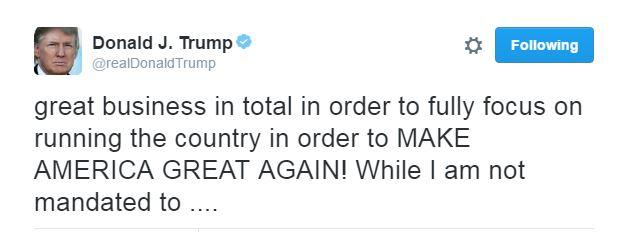
Mr Trump said on the campaign trail and after his election that he planned to pass control of Trump Organization to his three adult children - Donald Jr, Ivanka and Eric.
Passing control of the Trump Organization to his family hasn't eliminated concerns about potential conflicts of interest, or about Mr Trump's ability to enrich himself through the presidency.

What do Mr Trump and his family own?
The Trump Organization is a wide-ranging, international business. It is privately held and thus not required to disclose everything it owns.
But some of Mr Trump's holdings are well known.
Campaign financial disclosure showed he makes much of his money from golf courses, including two he owns in Scotland. The Trump Organization made an estimated $193m from golf-related income in 2014.
The Trump Organization also earns income by licensing the Trump name to building developers around the world, including in Turkey, India and Panama.
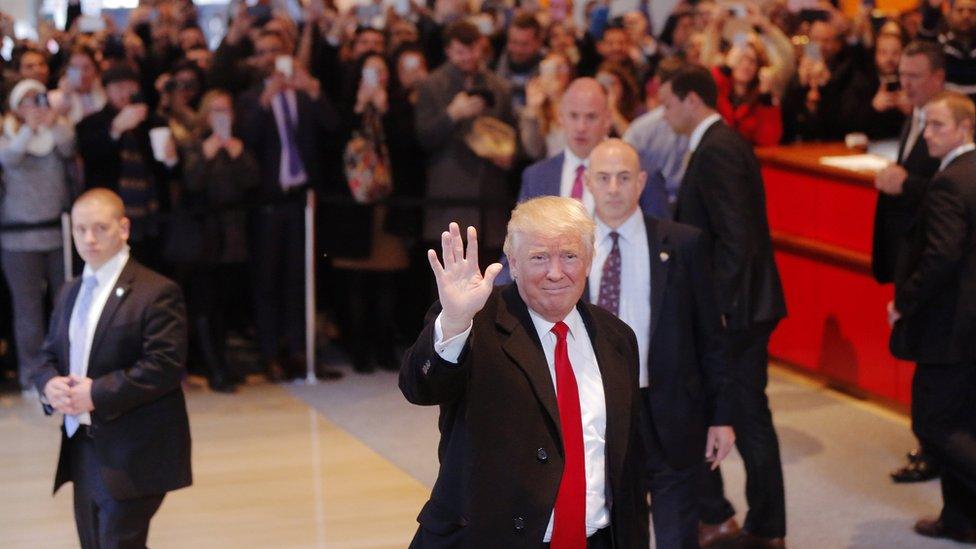
Donald Trump walked into the New York Times' lobby on Tuesday
There's also a variety of real estate holdings: ownerships or investments in hotels, offices and residential buildings.
Mr Trump's refusal to release his tax returns, another source of information about how he makes money, means his business dealings are still largely opaque.
His firm also owes large debts. An investigation by the New York Times, external found Mr Trump's businesses owed at least $650m (£522m), some to the Bank of China and Deutsche Bank.
His daughter Ivanka runs a clothing line and jewellery brand, in addition to her position at the Trump Organization.
Her husband, Jared Kushner, owns the New York Observer newspaper and is a real estate developer. Eric and Donald Jr are both executive vice presidents at the Trump Organization.

Can he hold on to his business?
As president, Mr Trump will also technically be allowed to run his business.
The US has conflict of interest laws that specifically prevent government employees, such as the White House staff, from having these types of business ties, but they do not apply to the president or vice-president.
That doesn't mean Mr Trump will not run the risk of violating US law by continuing to profit from the Trump Organization while in charge of the country.

What happens when parts of the Trump Organization have to deal with the US government?
There are several opportunities for conflict.
Mr Trump's hotel in Las Vegas has a current dispute with a hotel workers' union. In November, the National Labor Relations Board (NLRB) ruled against the Trump Organization and ordered it to negotiate with the union.
The firm has appealed against this decision, and the case will go to district court, where a justice department lawyer will argue against the Trump Organization.
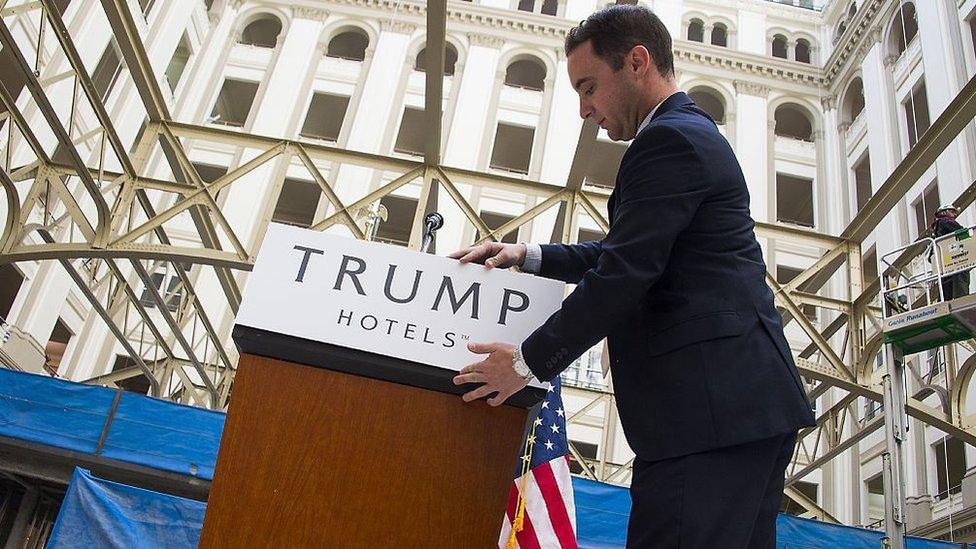
Donald Trump opened his hotel in Washington DC earlier this year. He rents the building from the US government
Starting in January, Mr Trump will have the ability to fill two empty spots on the NLRB. The head of the justice department, the attorney general, is also nominated by the president.
Mr Trump also holds a lease with the General Services Administration (GSA) for his hotel in Washington, another agency with a politically-appointed leader.

Will the Trump Organization's international deals be a problem?
Mr Trump's overseas business interests invite questions of whether his foreign policy decisions are directed by US interests or by his own business interests.
A section of the US Constitution known as the Emoluments Clause restricts what US presidents can accept from foreign governments.
The clause says "no person holding any office of profit or trust" may accept "any present, emolument, office, or title, of any kind whatever, from any king, prince, or foreign state".
America's founding fathers included this to prevent US leaders from being beholden to foreign governments.
If the Trump Organization accepts special deals, such as tax breaks or land rights overseas, it could run foul of the clause. Even overseas profits could be viewed as a violation.
Looming Trump Organization deals have already raised questions. After Mr Trump was elected in early November he spoke over the phone with Argentinian President, Mauricio Macri. After that call the company issued a press release indicating Trump Tower Buenos Aires - which had been waiting permit approval to be built - was a done deal.
Meetings with Indian business partners and current projects in places like the Philippines and Brazil are also raising questions about what the power of the Presidency could do for the Trump brand's international negotiating power.
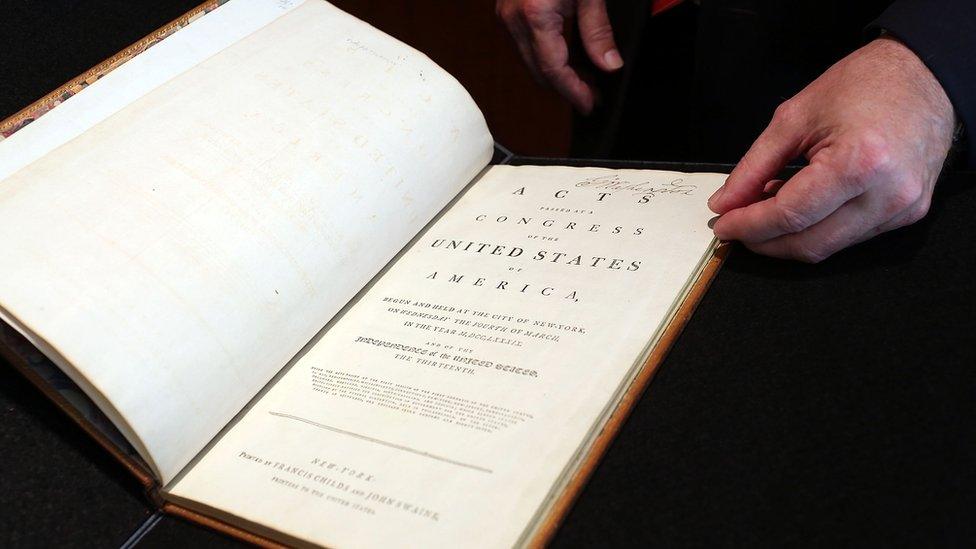
The US Constitution has a clause preventing presidents accepting gifts from foreign governments

Some more examples of Trump conflicts
The Secret Service would reimburse Mr Trump's firm for any travel they take with protectees (i.e. Melania) on his private planes.
The Phillippines' new trade envoy to the US is the same man who is building Trump Tower Manila.
A waterfront property in Rio de Janeiro, branded with the Trump name through a licensing deal, is the subject of a federal inquiry after two small Brazilian pension funds invested heavily in the unfinished project, with allegations of bribery.

What would happen if Mr Trump did violate the Emoluments Clause?
If Mr Trump did violate the Emoluments Clause, Congress could take action by impeaching him.
The process allows Congress to bring a charge and launch a trial against a president.
If a president were found to be guilty, he would be removed from office, immediately.
According to the Constitution, "treason, bribery, or other high crimes and misdemeanours" are all reasons for impeachment, giving Congress a great deal of flexibility.
But as Republicans will now control both the House and Senate, a portion of Mr Trump's own party would have to vote for such a process.

How can conflicts be avoided?
On the campaign trail, Mr Trump promised to set up a blind trust controlled by his children.
A blind trust is a fund that has been set up with the express purpose of separating a person from knowledge of how their money is being invested.
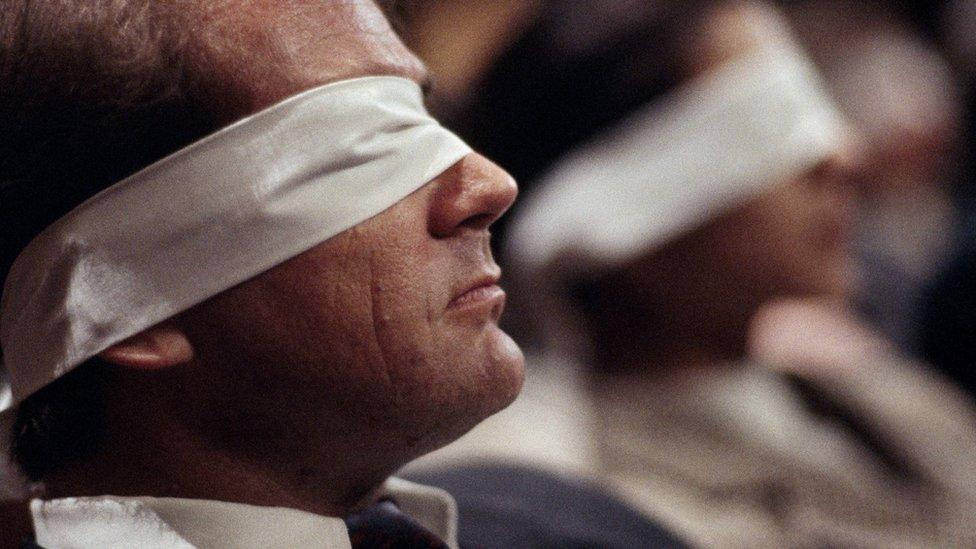
The first president to set up a blind trust was Lyndon Johnson in 1963
The person setting up the trust turns over control of their assets to an independent financial adviser - keeping the trust's owner "blind".
The owner can also sell their stocks or bonds before giving the money to the adviser to reinvest, adding another layer of separation from knowledge of how their money is invested.
The first president to set up a blind trust was Lyndon Johnson in 1963.
Since then, most presidents have opted to create blind trusts when they enter the White House to remove any conflicts of interest.
President Barack Obama did not create a blind trust, but instead invested in mutual funds and other broad financial instruments he could not control.
For Mr Trump, it would be impossible to set up a "blind trust" for a business conglomerate helmed by his own children, especially ones who have been playing an active role in his transition.
Ivanka Trump has been involved with meetings and phone calls with world leaders. Her husband is trying to find a way around nepotism laws, external that prevent him from working in the White House.
If Ms Trump were running the company, her father - and potentially her husband - would have insider information about the government's plans.
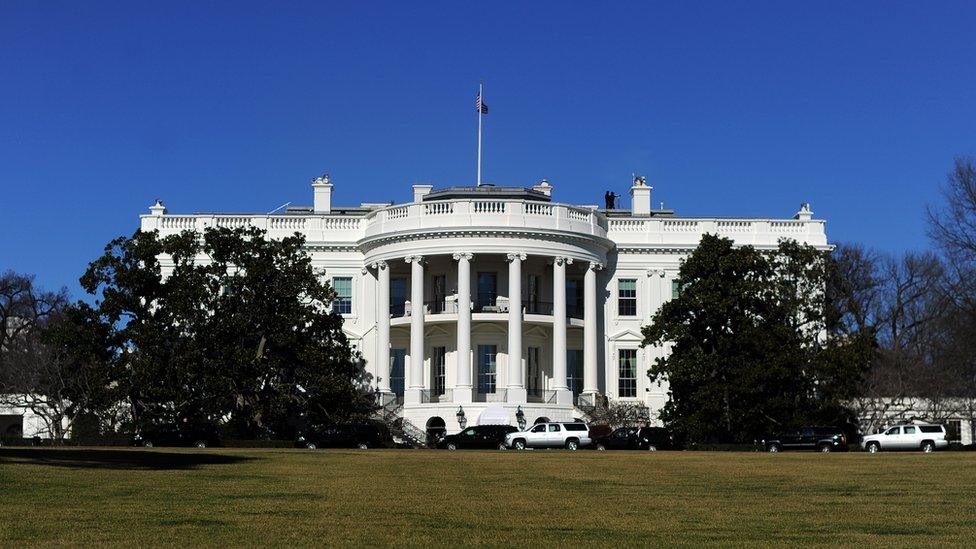

What has Mr Trump done to avoid conflict?
Not much.
"The law is totally on my side," Mr Trump told the New York Times recently, external. "The president can't have a conflict of interest." Still, he told the Times he was eager to avoid any conflicts.
Earlier, he tweeted: "Prior to the election it was well known that I have interests in properties all over the world. Only the crooked media makes this a big deal!"
Mr Trump has also been reluctant to sell off his assets, telling the Times: "That's a very hard thing to do, you know what, because I have real estate... selling real estate isn't like selling stock."
Even if he handed over control of the business to independent management, there are still issues with fully separating himself because of the nature of the business.
Mr Trump's main asset is his brand. It will be easy for him to see just how well Trump hotels or golf courses are doing - including his newest hotel in Washington, just a few streets away from the White House.
Mr Trump's potential conflicts of interest if he became president were well-documented, external before election day.

Has Mr Trump already had conflicts of interest since being elected?
Mr Trump becomes president of the United States on 20 January. He has until then to sort out how he will manage his assets to avoid such conflicts.
So far, Mr Trump has shown little concern for avoiding these pitfalls.
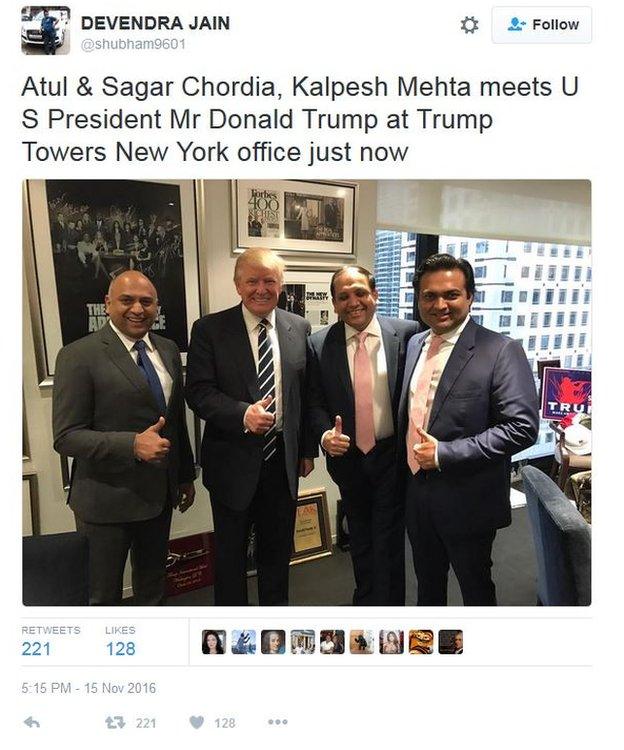
He met Indian business partners developing a Trump-branded project in western India, just a week after the election.
He also allegedly asked Ukip's Nigel Farage, to oppose building wind farms near his golf course in Scotland, because Mr Trump believes it will lower the course's prestige.
A key promise of Mr Trump's campaign was "draining the swamp" or eliminating the ties between big business and government in Washington.
If Mr Trump really means that he could start with his own.
Additional reporting by Taylor Kate Brown
- Published10 November 2016
